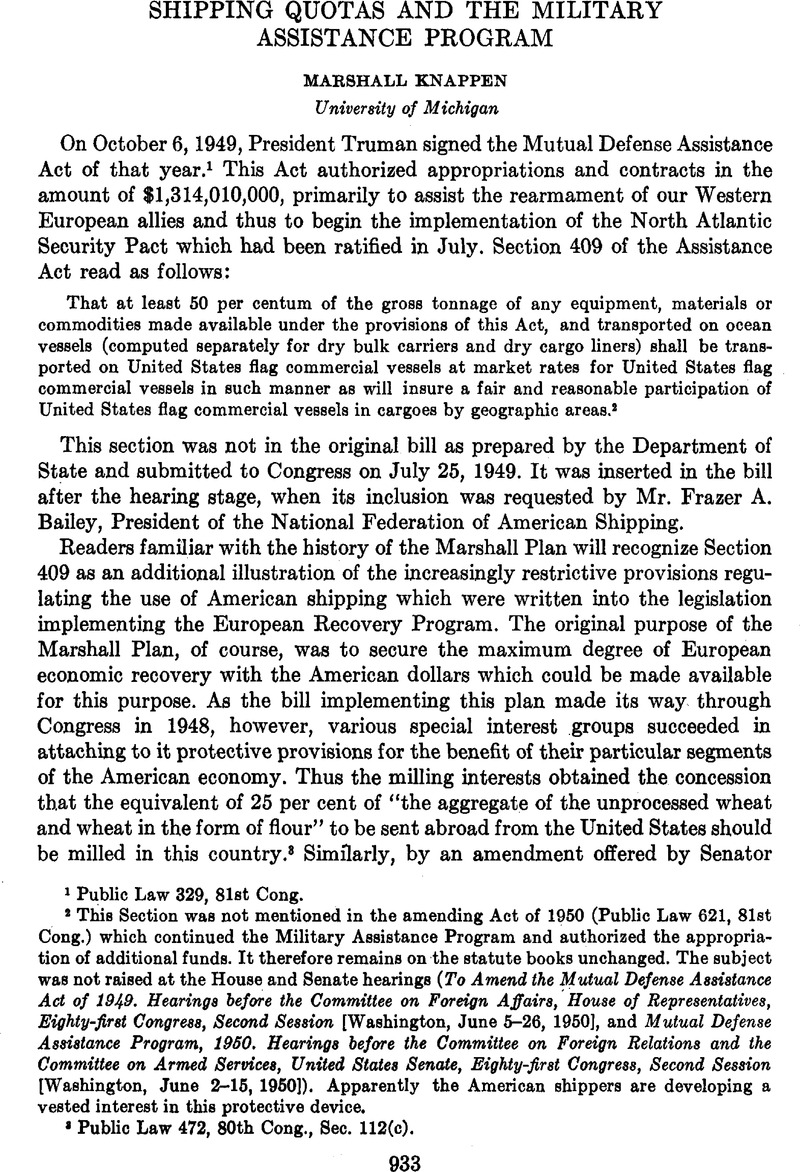No CrossRef data available.
Published online by Cambridge University Press: 02 September 2013

1 Public Law 329, 81st Cong.
2 This Section was not mentioned in the amending Act of 1950 (Public Law 621, 81st Cong.) which continued the Military Assistance Program and authorized the appropriation of additional funds. It therefore remains on the statute books unchanged. The subject was not raised at the House and Senate hearings ( To Amend the Mutual Defense Assistance Act of 1949. Hearings before the Committee on Foreign Affairs, House of Representatives, Eighty-first Congress, Second Session [Washington, June 5–26, 1950]Google Scholar, and Mutual Defense Assistance Program, 1950. Hearings before the Committee on Foreign Relations and the Committee on Armed Services, United States Senate, Eighty-first Congress, Second Session [Washington, June 2–15, 1960]Google Scholar). Apparently the American shippers are developing a vested interest in this protective device.
3 Public Law 472, 80th Cong., Sec. 112(c).
4 Sec. 111 (a) (2).
5 New York Times, August 14, 1948, p. 1 Google Scholar; Dec. 22, 1948, p. 14.
6 New York Times, Deo. 22, 1948, p. 14 Google Scholar.
7 Sale, Charter, and Operation of Vessels. Hearings before the Committee on Merchant Marine and Fisheries, House of Representatives, Eighty-first Congress, First Session, on H. J. Res. 92 and H. R. 1340 (Washington, Jan. 25–Feb. 8, 1949), p. 205 Google Scholar. Hereafter cited as Hearings on H. R. 1340.
8 Extension of European Recovery Program. Hearings before the Committee on Foreign Affairs, House of Representatives, Eighty-first Congress, First Session, on H. R. 2362 (Washington, Feb. 8–18, 1949), Vol. 1, p. 310 Google Scholar. Hereafter cited as Hearings on H. R. 2362.
9 New York Times, Dec. 8, 1948, p. 1 Google Scholar.
10 Congressional Record, Vol. 95, Pt. 3, pp. 4207–09Google Scholar, esp. p. 4208 (81st Cong., 1st Sess., April 9, 1949).
11 Hearings on H. R. 2362, Vol. 1, p. 311 Google Scholar.
12 Wood, C. Tyler, Assistant to the Deputy Administrator, to Boyd Crawford, March 4, 1949, Hearings on H. B. 2362, Vol. 2 (including hearings on H. R. 3748), p. 829 Google Scholar.
13 Statement by Mr.Bailey, Frazer A., Hearings on H. R. 1340, pp. 2–5 Google Scholar.
14 New York Times, March 18, 1949, p. 51 Google Scholar; Dec. 22, 1948, p. 14.
15 New York Times, March 23, 1949, p. 55 Google Scholar.
16 Hearings on H. R. 1340, p. 212.
17 Public Law 47, 81st Cong., Sec. 6; Congressional Record, Vol. 95, Pt. 3, p. 3857, pp. 4207–09 (81st Cong., 1st Sess., April 5 and 9, 1949)Google Scholar.
18 Ibid., p. 3858 (April 5, 1949).
20 This provision remained unchanged after the passage of the Economic Cooperation Act of 1950 (Public Law 535, 81st Congress), which authorized the continuation of the European Recovery Program for the third year. The only reference in the 1950 Act to this issue is a provision (Sec. 106) that foreign beneficiaries may be exempted by the Administrator from the obligation to deposit local currency equivalents in the Counterpart Funds in respect to “an amount not exceeding the amount, as determined by the Administrator, by which the charges for … transportation [on United States flag vessels] exceed the cost of such transportation at world market rates.” This provision, of course, constitutes an acknowledgment that the expense is not an essential part of the European Recovery Program.
20 Mutual Defense Assistance Act of 1949. Hearings before the Committee on Foreign Affairs, House of Representatives, Eighty-First Congress, First Session, on H. R. 5748 and H. R. 5895 (Washington, July 28–Aug. 8, 1949)Google Scholar.
21 Military Assistance Program. Joint Hearings before the Committee on Foreign Relations and the Committee on Armed Services, United States Senate. Eighty-First Congress, First Session, on S. 2388 (Washington, Aug. 8–19, 1949), pp. 171–75Google Scholar.
22 Senator Vandenberg. Under the ECA Act, you state the comparable provisions apply to cargoes moving to and from the United States. I notice you have left that limitation out of your proposed amendment. Did you do that deliberately?
Mr. Bailey. It was our feeling that 50 per cent of any commodities made available under the ECA Act should be moved on American ships, but there was a compromise reached in which only the cargoes to and from the United States were included in the ECA Act.
Senator Vandenberg. YOU would be reasonably content if you got what you are after with that limitation, wouldn't you?
Mr. Bailey. We feel that we should have all that is made available under the act, Senator, but we leave ourselves in the hands of the committee (ibid., p. 173).
23 Ibid., pp. 172–73. In fairness to the author of this statement, it should be pointed out that this line of argument was advanced before the loss of our monopoly in the matter of atomic bombs (in September, 1949) and the attack on South Korea (June, 1950) rendered the problem of maintaining the security of the North Atlantic area as acute as it has now become.
24 An Inquiry into the Nature and Causes of the Wealth of Nations (2 Vols.; London, 1922), Vol. 1, p. 429 Google Scholar.
25 New York Times, Dec. 30, 1948, p. 8 Google Scholar.
26 Crouch, Holmes F., “A Well Disciplined Merchant Marine?” United States Naval Institute Proceedings, Vol. 74, pp. 1467–79 (Dec., 1948)Google Scholar. The author, a lieutenant in the United States Coast Guard, served on Merchant Marine inspection duty in San Francisco during part of the war and at the time of writing was with the Office of Merchant Marine Safety at Coast Guard Headquarters.
27 New York Times, July 25, 1950, p. 51 Google Scholar; July 31, p. 16; Aug. 2, p. 1; Aug. 4, p. 37; Aug. 5, p. 29; Aug. 8, p. 47; Aug. 9, p. 55.
Comments
No Comments have been published for this article.